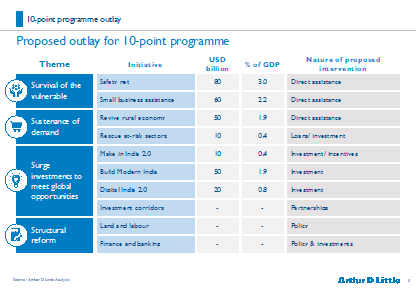Indian economy to contract by over 10% in FY21, bold measures needed for recovery: Arthur D Little report
Delhi: India reported its first COVID-19 case on 29 January 2020, a medical student studying in Wuhan who had returned to Kerala on 24 January. Since 25 March 2020, India has been on a national lockdown with a few relaxations since 3 May 2020. As of 10 May 2020, India had reported over 65,000 cases and more than 2,000 deaths. Infections and the death toll will keep rising till early autumn and so will the damage to people and businesses. Containing the virus needs to be the primary focus. However, as India opens for business, it is important to estimate the impact of the pandemic on the Indian economy – particularly on growth, jobs and unemployment, and overall poverty.
A new report released today by Arthur D Little, India titled “India: Surmounting the economic challenges posed by COVID-19: A 10 point programme to revive and power India’s post-COVID economy” aims to provide a realistic picture of the economic impact of COVID-19 on India and what’s needed to rebuild a dynamic and equitable economy. According to the report, the worst of COVID-19’s impact will be felt by India’s most vulnerable in terms of job loss, poverty increase and reduced per-capita income, all of which will be reflected in a steep decline in GDP. Up to 135 million jobs could be lost and 120 million people could be pushed back into poverty, all of which will reduce consumer income, spending and savings.
“India is headed towards a W-shaped economic recovery with a potential GDP contraction of 10.8% in FY21. An opportunity loss of USD 1 trillion is staring India in its face. For its USD 5 trillion vision, a radical economic approach is needed, centered on an immediate stimulus and structural reforms. The Prime Minister’s visionary Atma Nirbhar Bharat Abhiyan is a good start to this new approach.” says Barnik Chitran Maitra, lead author of the report and Managing Partner & CEO of Arthur D Little, India and South Asia.
“The government recovery programme needs to provide a comprehensive safety net for vulnerable sections and support micro, small and medium enterprises. Clear policy announcements, comprehensive safety nets and decentralized systems of governance will be essential to not only flatten the curve, but also reverse the economic trajectory” adds renowned economist and author, Ashwini Deshpande, Professor of Economics at Ashoka and Director of Centre for Economic Data and Analysis (CEDA), and one of the co-authors of a counterpoint included in the report.
While COVID-19 presents a grave threat to India’s economic potential, it is equally an opportunity for India to revisit all the obstacles that lie in its path to greater prosperity. The report proposes a bold 10-point programme requiring a USD 280 billion of spending and investment measures which should be supported by policy reforms, and proportionate monetary and liquidity measures to secure a sustainable economic future for 1.3 billion Indians.

